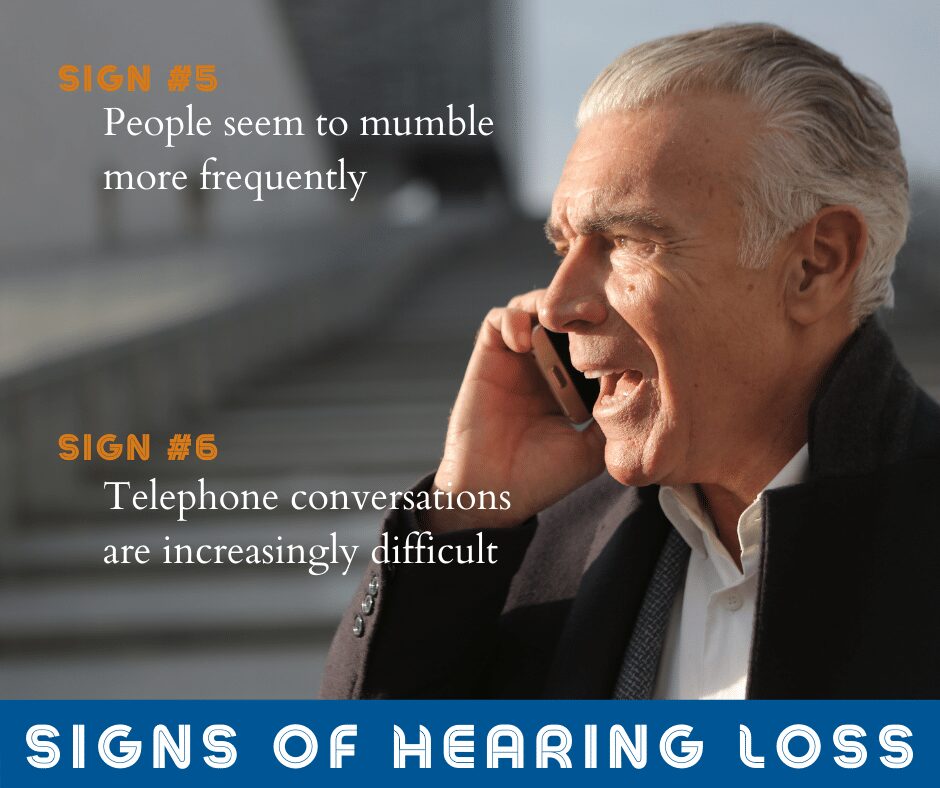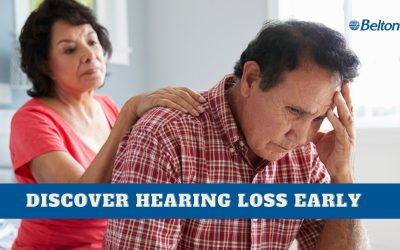
There are many signs of hearings loss that you can begin to look for in yourself and or in loved ones. It can be more difficult to notice changes within yourself than it will be to notice in others.
Can you repeat that again? Do you often have to ask people to repeat themselves when they are talking to you? Constantly feeling like you are missing words, phases, or pieces of the story can be frustrating and also confusing. When you tell like you are decoding a message verses listening to story, you may have hearing loss.
- You have been told you talk to loud. Talking too loudly is a common sign of hearing loss. Your speech increases in volume, simply because you cannot hear yourself talk. Talking too loud can be from damage to the inner ear or the auditory nerve and is a clear sign of hearing loss.
- Ringing in your ears. If you experience ringing in your ear or ears you may be stuffing from tinnitus. Tinnitus is typically a symptom of hearing loss and can be caused from natural age-related hearing loss or injury to the ear itself. Tinnitus is an internal noise that only you can hear such as ringing, buzzing, humming, or roaring noise that is not present to others around you.
- Difficulty having a conversation in a large group or crowd. Background noise can make it difficult for anyone to hear; however, when you have hearing loss, it becomes even more challenging to focus in on one sound or voice. We naturally teach ourselves to focus on one noise or sound, and ignore other sounds or noises in the room. When you stuffer from hearing loss, this can became increasingly difficult to do or manage, which can make hearing in a large room or crowd difficult.
- No longer hearing normal household sounds. If you do not hear something, does that mean it is not happening? No, it is still happening- you are just not aware of the it anymore because you cannot hear the sound or noise it makes. An example of this would be if the water faucet dripped or leaked. Or someone standing at your door ringing your doorbell. Missing everyday household noises, is another sign of hearing loss that can happen slowly over time, but can cause issues with your everyday life.
- People tell you the radio or the TV are too loud. Does your family complain that you play the radio or TV too loudly? You might keep clicking the volume up and up until you can hear it. By turning the volume up, it compensates for hearing loss or hearing damage from the inner ear. Whereas, when you have visitors that do not have hearing loss, they quickly realize the volume is well above the normal decibel of regular sounds. Listen to your friends and family if they say you play the volume too loudly. It might mean it is time to get your hearing tested.
- People seem to mumble more frequently. When people around you begin to mumble, it is a tell-tale sign of hearing loss. As we begin to lose our hearing, one of the first things we lose is the ability to discern sound frequencies. We will hear vowels sounds more clearly than consonants. So sounds truly become manipulated and hearing clearly becomes more difficult.
- Talking on the phone is difficult. When we talk on the phone, we only use one ear at a time. Whereas, when we are listening without the phone to a person speak, we naturally use both ears, the speaker’s body language, and other context clues to stay engaged in the conversation. So when we are on the phone, it can show weaknesses in a singular ear and make it difficult to understand and follow the conversation.
- You feel like you’re getting clumsier. As you lose your hearing, you can also lose your balance which can make you feel clumsy. The inner ear houses a small tube of fluid that helps your whole body maintain balance and equilibrium. If you are stuffing from hearing loss from damage to the inner ear canal, it can directly affect your sense of balance and space. According to AARP, “When you put hearing aids on people with hearing loss, their sense of balance and ability to sense where they are in space improves immensely.”
Early Detection To Protect Against Hearing Loss
Prevention and early detection of hearing loss or ear damages are always best. We recommend that your get your ears checked regularly and starting at the age of 45 get your ears checked at least once a year. You do not have wait until you have signs of hearing loss before getting help. Be proactive!
Prevention Of Hearing Loss
According to our Beltone hearing specialist and the Mayo Clinic there are several easy ways to help prevent hearing loss.
- Protect your ears. Limiting the duration and intensity of your exposure to noise is the best protection. When available, make sure to wear protective earmuffs when working with loud equipment or noises.
- Have your hearing tested. All Beltone offices offer free hearing tests and consultations, as well as free online hearing tests. If you have loss of hearing, begin to take more serious precautions to protect your hearing to prevent further hearing loss.
- Avoid recreational risks. Continuous loud sounds such as music or rock concerts, using heavy equipment, power tools, or firing guns, can cause damage major damage to the inner ear. Allowing your ears a break while doing these actives can be helpful, but it is recommended to wear protective ear coverings for sounds over the 90 decibels.
The Environmental Protection Agency’s (EPA) safe noise level is 70 decibels. The louder the noise, the less time it takes to cause permanent hearing damage. The chart below lists common sounds and their decibel levels.
Sound Levels Of Common Noises
| Decibels | Noise Source |
|---|---|
| Safe Range | |
| 30 | Whisper |
| 40 | Refrigerator |
| 60 | Normal Conversation |
| 75 | Dishwasher |
| Risk Range | |
| 85 | Heavy city traffic, school cafeteria |
| 95 | Motorcycle |
| 100 | Snowmobile |
| 110 | Chain saw, jackhammer, rock concert, symphony |
| 115 | Sandblasting |
| 120 | Ambulance siren, thunder |
| 140-165 | Firecracker, firearms |



